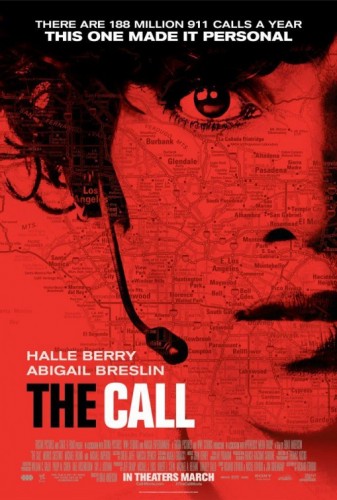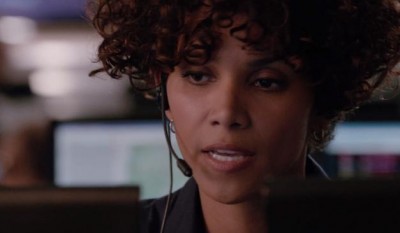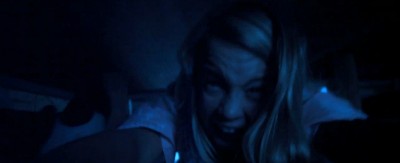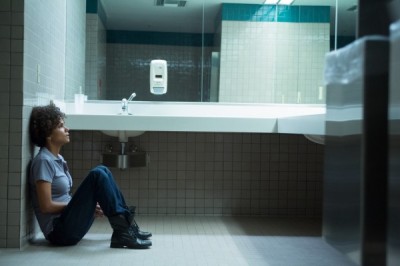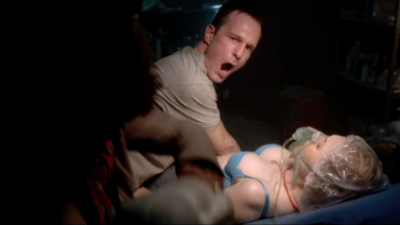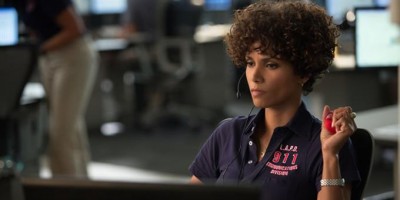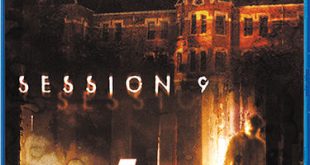Veteran operator Jordan (Halle Berry) Turner, still reeling from a 911 call months ago that resulted in the death of the caller, must face her fears when another similar caller phones in. In this case, Casey (Abigail Breslin) Welson finds herself kidnapped and thrown into the trunk of a killer’s car. Jordan struggles to keep the girl calm, safe and alert in hopes someone will notice her waving from the back of the car on the freeway, and they will then also call into 911 revealing Casey’s location. Finding the car is Jordan’s only hope to saving Casey. But just as the police close in, the killer (Michael Eklund) discovers what is going on and Jordan finds herself in nearly identical circumstances with the young girl’s life hanging in the balance.
REVIEW:
The Call, from director Brad Anderson, is not the film most movie goers expect it to be, nor is it anywhere near the disaster many predict it has to be based on its unimaginative title (which is still oddly better than it previous title, The Hive) and its debatable lackluster marking. With Halle Berry in the lead, giving an incredibly strong and emotional performance, the film is exceptional, tense and rousing, full of emotion, action and suspense. Even when the third act steps over the line of believability, as it tries to mold its lead into a female version of John McClane, the film manages to stay on track, delivering a fun, entertaining thriller: one that is easy to recommend. Yes, recommend. The film takes advantage of the unknown elements of a 911 call, not only from the caller’s point of view, but from the operator’s perspective as well which proves to be highly entertaining and gripping. It deals with the emotional toll it takes on the operator and faces the dangers confronting the victim on the other end of the line. It can easily be literally life and death. It’s a pulse that drives the film, Halle Berry’s character Jordan and the audiences gasps and screams.
The Call begins with Jordan Turner working in the heart of the 911 call center in L.A., called The Hive. She, and those around her, take the emergency calls and dispatch them to the police officers on the street. They are the lifeline for many who call in. In the opening scenes, Jordan takes a call from a young girl who is hiding from an intruder breaking into her home. Desperate to save the young girl, Jordan makes a mistake that costs the girl her life. Months later, Jordan is still trying to recover from the emotional stress, but remains at The Hive, now working as a trainer, teaching young employees how to become a 911 operator. When a young girl, Casey Welson, calls in after being kidnapped and thrown into the trunk of a car, Jordan finds herself taking over for a young rookie in order to save the victim’s life. This sets up a number of running tense story lines from Jordan dealing with her internal struggle to not fail again, to Casey’s struggle to survive, to the police officer’s (Morris Chestnut as Officer Paul Phillips) struggle to locate the moving vehicle and save the young girl’s life. Add to that an unhinged killer named Michael Foster (Michael Eklund) who becomes increasingly dangerous as the film progresses. Even when Casey’s call to The Hive ends, Jordan’s efforts to save the teenager does not – she continues to crack clues to uncover the killer’s location.
The Call is directed by Brad Anderson who ushered such films as Session 9 (2001), The Machinist (2004) and, more recently, Vanishing on 7th Street (2010). He is also the director of a dozen episodes of the television show Fringe. He gives The Call a treasure chest full of style, attitude and emotion. He employs interesting and effective camera angles to convey the claustrophobia of the victim’s confinement, the camera is forced up close on the subject’s face skewing their features and surroundings. It’s as if the audiences’ cheeks are pressed tightly up against Abigail Breslin for most of the picture, or, especially, Evie Thompson as the first victim Leah Templeton hiding under her bed. His handling of each encounter the killer has with random strangers is steeped with suspense and terror, his camera screaming out to the audience: “look out, this guy is going to get it – don’t look.” He builds the tension inside the assailant’s car trunk, so much so that it is difficult not to want to physically reach out in order to punch free the tail lights for her. He gets the audience inside the story, wanting to be free as strongly as Casey cries to be free or wanting to be savior as wholeheartedly as Jordan want Casey to survive.
The film’s biggest asset is Halle Berry who plays the 911 operator, Jordan Turner, with an enormous amount of humanity, courage and complexity. Her internal struggles facing fears of failing again, losing the life of the caller, is riveting and full of emotion. It is amazing to watch her character fight to keep not only the young victim Casey calm but herself as well, making sure her voice doesn’t tremble or she doesn’t say the wrong thing. But, Berry’s Jordan is a strong woman who jumps into action when needed, smart, resourceful and determined. She’s as big a hero as the current slew of cinematic heroes: Jack the Giant Slayer, the Wizard of Oz or Iron Man. Even when the script decides to take an extraordinary leap of faith during the final act, it’s Halle Berry that keeps the film grounded if by nothing but her determination alone. It’s ironic that they have to give her an abominable mushroom-shaped haircut and keep her face light on make-up to make her less Hollywood beautiful, to make her more civilian in appearance. It doesn’t make a difference, she gives the film her everything, ugly cry face and all. When the film could easily become tiresome or go off the rails in spectacular fashion, it is Halle Berry that keeps everything on track. It’s a great performance hidden in a poorly titled, poorly promoted film.
Abigail Breslin is a terrific counterpart to Berry’s Jordan as Casey Welson. She plays the character as an emotional opposite of Jordon, overconfident yet scared for her life, strong in the face of certain doom but not afraid to die, resourceful and resilient. Considering most of her screen time is confined to the inside of a trunk of a car or tied to a chair, she brings a tremendous amount of character to her role. She may be trapped but she is not out. She is able to be the crying victim when needed without becoming the annoying loud, bawling character. She wields her fear and terror as a sword ready for battle. She’s got spunk and that gives her part in the film that extra push to keep it lively beyond just the action. It gives it heart and power. Perhaps this is best displayed when she finally convinces Jordan to record her “final” message to her mother. The speech nearly cripples Jordon on screen and nearly crushes the audience watching. It is this hold she has on the character that allows the final act to work so well despite itself.
The script for The Call ends up positioning itself into a pickle that is difficult to escape. The 911 call is over, the bond between the caller and the operator is over. But, the movie is not. The story is not. Now what? How do you finish the film without leaving the lead, and the emotional tie, too far behind? How do you keep the film from being anti-climatic entirely? For over an hour, the film has established these two fascinating, emotional and entertaining characters, Jordan and Casey; it has to resolve this in cinematic fashion leaving reality behind, regardless to how effectively “real” the first two acts remained. Screenwriters Richard D’Ovidio, Nicole D’Ovidio and Jon Bokenkamp make a bold choice. Perhaps an obvious choice, but no less a risky choice. Basically, they have to get Berry’s Jordon out of The Hive and into the field into Casey’s story. It is to the credit of director Brad Anderson that he is able to pull this off, essentially making Jordan Turner a version of John McClane. Remarkably it works and is incredibly rewarding regardless of feeling somewhat hokey. It even manages to pull off a killer closing one liner that makes sense and means something.
The Call is a terrific early-season thriller, a spectacular tense film full of heart and emotion. Halle Berry is extraordinary as the hero, Jordan Turner bringing a down to Earth and strong role to the screen. She draws in the audience demanding they sit right along side her for the entirety of the film. Abigail Breslin is equally terrific as the kidnapped teenager, Casey Welson. She brings the film an entirely different type of strength where she must discover her will to survive to face adversity and harm. These performances tie a tightly woven bond between them that drive the film even as it bounces dangerously into its final act. Brad Anderson gives the film a unique identity with strong angles and shots to convey the claustrophobia and terror. He also handles the quiet beats as effortlessly as he does the more action packed scenes. The script makes some bold choices, but it has to and it succeeds in respect to making an entertaining and rewarding film. Despite all concerns and predictions, The Call is a great film: fun, thrilling, exciting and, best of all, emotional.
3.5 out of 5
The Call (2013)
 Horror News | HNN Official Site | Horror Movies,Trailers, Reviews
Horror News | HNN Official Site | Horror Movies,Trailers, Reviews
